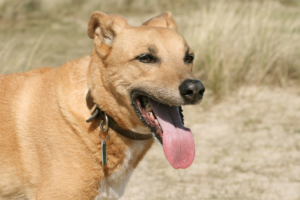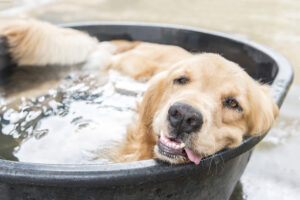Spunky little Yorkies — what could be better? From their adorably tiny stature to their perky ears and curious personalities, Yorkshire Terriers make for a truly adorable family member.
As with any breed, there are special considerations you’ll need to know when it comes to the diet and health of your Yorkie. This includes what (and how much) to feed them, so they get the right nutrients for their size, activity level, and more.
In this guide to Yorkie feeding recommendations, you’ll learn the following:
- What is the Best Dog Food for Yorkies and Yorkie Puppies?
- How Much to Feed Yorkies
- How Often to Feed Yorkies
- Common Health & Dietary Issues
What is the Best Dog Food for Yorkies and Yorkie Puppies?

Like other toy breeds (chihuahuas and Shih Tzus, for example), Yorkshire Terriers are small but mighty. And although they don’t need much food, that means what you do feed them is extremely important! You’ll want to make sure you’re serving food that’s chock-full of nutrients to ensure your pup gets everything they need without requiring a large amount of it.
In particular, look for the following when you’re choosing your dog’s food:
- Real, high-quality protein sources, like chicken, quinoa, beef, turkey, or lamb
- Nutrient-dense superfoods, like sweet potatoes, apples, and flaxseed
- NO preservatives, additives, byproducts, or fillers
It also matters how much and when you’re feeding your Yorkie, which we’ll get into next.
How Much Should I Feed My Yorkie Terrier?

So, how much should you be feeding your Yorkie? The amount will vary depending on your dog’s age, weight, activity level, and other health factors. Your vet will be able to help you determine the right amount. Yorkies, especially, are prone to becoming overweight because of their small stature, so it’s important to keep an eye on their diet.
Here are some general guidelines for feeding your Yorkie:
| Age | Feeding Amount | Calorie Requirements |
| 0 – 1 year* (2-4 lbs) | ¼ to ½ cup per day | 55 calories per pound of bodyweight |
| Adults (3-4 lbs) | ⅓ to ½ cup per day | 40 calories per pound of bodyweight |
| Adults (7-8 lbs) | ⅔ cup per day | 40 calories per pound of body weight |
*For very young Yorkie puppies (under 3 months old), most vets recommend feeding on demand to ensure your dog is getting the nutrients and calories that he or she needs.
Note that senior Yorkies (8+ years) may need less food than an adult Yorkie, especially if they’re not as active as they once were. Ask your vet for their specific recommendation, and check out our senior dog food suggestions here!
If it feels like you’re not feeding your Yorkie very much, that’s normal. While it seems like such a tiny amount, remember that your dog is tiny, too! As long as your Yorkie puppy is gaining weight appropriately or your adult Yorkie dog is maintaining their weight, you can feel confident that you’re feeding your dog enough. Again, check in with your vet to establish an appropriate feeding schedule.
Don’t forget to keep track of the dog treats, too — those can add up, especially if you’re training, so take them into account and adjust your dog’s meals as needed.
How Often Should I Feed My Yorkshire Terrier?
How often you feed your Yorkie is another important factor to keep in mind. Because Yorkies are so small, they actually need more frequent feedings than other breeds do. While larger dogs can easily go from breakfast to dinner, Yorkies can run into health issues if they go too long in between feedings. The most common issue is experiencing low blood sugar, also known as hypoglycemia.
Yorkies’ fast metabolisms also call for more calorie-dense food — as much as 10 calories per pound of body weight more than larger dogs.
A good feeding schedule for your Yorkie or Yorkie puppy is as follows:
- Yorkie puppies should be fed 4 times per day, spaced throughout the day; for example, you could feed your dog in the morning, around noon, early evening, and then later in the evening
- Adult Yorkie dogs (1 year or older) can typically go longer in between feedings; consider 3 meals per day, again spaced out throughout the day
As with humans, your Yorkie might also develop preferences for their meal size. Some dogs love a big, hearty breakfast, while others prefer a big dinner. Either is fine!
What About Teacup Yorkies?
Teacup Yorkies (also referred to as toy Yorkies or mini Yorkies) are simply bred to be much smaller than normal Yorkshire Terriers, clocking in at a petite 2-4 pounds on average. With teacup Yorkies, it’s even more important to offer frequent feedings to avoid the risk of hypoglycemia. Similar to the recommendations above, go off of your Yorkie’s weight to determine the right amount of food, and check with your vet for any additional health considerations. Teacup Yorkies are prone to heart and liver problems, unfortunately, because of their teeny-tiny size.
Diet-Related Health Issues in Yorkies

You are what you eat, and that goes for Yorkies, too! As we mentioned earlier, it’s extra important to monitor your Yorkie’s diet to set them up for a long and healthy life. In the sections below, we’ll outline some of the most common health issues to note.
Hypoglycemia
We touched on hypoglycemia earlier, and it’s worth mentioning again. This scary condition is all-too-common for small dogs like Yorkies, and can cause an upset stomach, lethargy, weakness, and discoloration of skin and gums. A lack of appetite can also be a sign of hypoglycemia. If your Yorkie won’t eat, be sure to check with your vet. You might just have a picky eater, but it’s a good idea to rule out the condition first.
Obesity and Diabetes
Because they’re so small, even an extra ½ pound can make a big difference when it comes to your Yorkie’s weight. The average Yorkie weighs about 4-7 pounds, so you may want to speak with your vet if your dog is more than that. However, keep in mind that you should always go off your dog’s frame, as the ideal weight for your Yorkie will vary based on that.
A good rule of thumb is to look at their ribs: you should be able to feel them, but not see them. If you need to help your Yorkie lose weight, you can either reduce the amount of food you’re providing at each meal or increase your dog’s activity (or both). How much exercise does your Yorkie need, exactly? Yorkshire Terriers need one or two brisk walks each day, as well as a couple of sessions of vigorous activity each week.
Yorkies are also prone to diabetes, which is when they can’t properly regulate the metabolism of sugars in their bodies. Symptoms may include excessive thirst, weight loss, and increased urination. If you notice any of these signs, mention it to your vet.
Additionally, you may notice digestive issues or a more sensitive tummy, especially if you change your Yorkie’s food. Always make sure to switch food slowly, and select meals that are easily digested, such as a lamb-based option.
Heart Conditions
Yorkshire Terriers are prone to heart conditions, in part because their organs are so small! Adequate exercise and a high-quality diet are key to keeping your pup healthy and happy. If your Yorkie is diagnosed with heart disease or heart failure, you may need to switch to a diet that restricts sodium or add in extra supplements. As always, speak to your vet to understand your pet’s specific needs.
Picky Eaters
Finally, Yorkies are known for being finicky! You may need to experiment with different textures and flavor profiles to find the best option for your picky eater. (Tip: With PetPlate, you can mix and match our four recipes and see which one your Yorkie likes the best!)
So What is the Best Diet for a Yorkie?

Your Yorkie’s ideal meal plan will be one that is high-quality and high in calories and nutrients, all to perfectly support their adventure-loving nature. And with PetPlate, you get all that and more. Our meals are made with 100% human-grade ingredients and kettle-cooked in a USDA kitchen, following the same safety standards used to make human food. Plus, we deliver right to your doorstep — cutting out the time you’d normally spend cooking or shopping. No fuss, no errands, and no extra dishes to wash.
Ready to give us a try? Tell us about your dog and we’ll put together a customized meal plan just for you. Start today and discover the ease and convenience of delicious, nutritious PetPlate meals.


